This month we provide an update on the Hôpital de la Miséricorde and analyze controversial plans by Hydro-Québec to integrate an electricity substation into the haunted site. The ghost-ridden Hôpital de la Miséricorde has been empty for years and is starting to crumble. Located on prime real estate in Downtown Montreal...
Welcome to the twelfth installment of the Haunted Montreal Blog! Released on the 13th of every month, the April edition focuses on research we are carrying out into La Cinémathèque québécoise. Located in a former Catholic girls’ school, this film library and cinema is reputed to be haunted.
HAUNTED RESEARCH
Montreal’s hip Quartier Latin neighbourhood plays host to numerous theatres, cinemas and cultural and educational facilities. Located in the eastern part of the Quartier des Spectacles, the area is renowned for both entertainment and education. La Cinémathèque québécoise is a government-funded film library, set in an old Catholic elementary school, that screens movies which were often made in Quebec. A popular cinematic diversion in a bustling area, the facility is enjoyed by thousands of local cinephiles and tourists every year.
However, despite the cinema’s jovial atmosphere, there are persistent rumours that the building is haunted by the ghost of a little schoolgirl. Janitors have reported seeing her on many occasions, and in 2005, the girl’s spirit was spotted by an employee in one of the projection rooms, clutching a stack of school books. Could the ghost be one of the school’s former students, and if so, why is she haunting the building?
Looking at the history of the vicinity, Montreal’s Red Light District was bursting at the seams in this same area during the roaring 20s. The ramshackle neighborhood was characterized not only for its numerous brothels and prostitutes working the street corners, but also by its rampant poverty and severe overcrowding. Never the best place to raise children, the Red Light District was an unsanitary and dangerous place to be at times. Not only was rampant violence a common theme in the neighborhood, but older children, usually female, were also at risk of being recruited and trafficked by unscrupulous pimps.
Religious authorities with the Catholic School Commission of Montreal (la Commission des écoles catholiques de Montréal) intervened and had the Saint-Jacques Boys’ School built in the heart of the Red Light District in 1921. Located on the corner of Sanguinet and de Montigny Street (now de Maisonneuve), it was designed to serve the Saint-Jacques Parish. The following year, the Jeanne-Mance School for Girls was erected immediately to the east of the boys’ school, forming a small zone where youth could focus on education instead of all the endless shenanigans unfolding throughout the Red Light District.
Just one block north, for example, existed Canada’s most notorious brothel at 312 Ontario Street, where 80 prostitutes worked in three shifts around the clock. Opened for business from the World War I until the 1950s, the first floor of the building included a smoky salon to drink, dance, and socialize. The upper floors of the brothel were described as a “honeycomb” of approximately 80 small rooms where locals, tourists, and soldiers could experience prostitution. 312 Ontario was run by a notorious manager named “Madame Bobbe” and was located just across from Police Station Number 4. From the window of his office, the commanding officer could clearly see the debauchery, although he usually turned a blind eye.
The teachers at the Jeanne-Mance School for Girls, all nuns, wanted to ensure their charges were protected from the debauchery associated with the Red Light District and 312 Ontario. The nuns were very strict and taught handwriting, history, and grammar among other subjects, including catechism to ward off any sinful thoughts. Nuns were known to punish students by smacking them with rulers, especially if they wrote with their left hand, which was seen as a sign of the Devil. For decades, the nuns diligently educated their Catholic schoolgirls. Slowly, on the heels of World War II, the neighborhood began to change. The Red Light District slowly began to fade after the Canadian Army ordered it shut down because soldiers were contracting too many sexually-transmitted infections, endangering the overall war effort.
By 1968, Quebec’s education system was transforming from a religious system to a more secular one. After 45 years of teaching Catholic schoolgirls, the nuns decided to change their mission to social work and religious engagement. They replaced the nun’s habit with street clothing and set to work among the destitute. Two of them continued teaching at the school, with a new clientele of itinerants and others in need. In 1978, the nuns finally moved away to teach at Collège Regina Assumpta on Gouin Boulevard, leaving the Jeanne-Mance School for Girls empty.
Meanwhile, the Cinémathèque québécoise was founded in 1963 with a mission is to “preserve and document film and television heritage in order to make it available to an ever-growing and diversified public.” It hosts an extensive collection which includes tens of thousands of films, television programs, posters, photos, pieces of historical equipment, scripts, production files, books, magazines, props, costumes and other items associated with the film industry.
In 1982, the Cinémathèque québécoise acquired the old Jeanne-Mance School for Girls and moved into the premises. From 1994 to 1997, the complex was extensively redesigned and enlarged by the architectural firm Saucier + Perrotte, earning the 1999 Governor General’s Award for Architecture.
Everything seemed to be going very well at the Cinémathèque québécoise until an unexplained incident in 2005, which left many of the staff members feeling deeply disturbed.
In October, 2005, staff at the Cinémathèque québécoise were alarmed by a spike in paranormal activity in the building. As Hallowe’en approached, strange, inexplicable sightings and unexplained phenomena became more and more frequent. A young woman was working at the Cinémathèque québécoise as a ticket-taker and one evening she found herself in one of the projection rooms. As a film rolled, she witnessed the ghostly figure of a little girl, clutching a stack of school books, enter the cinema. Not believing her eyes, she began inquiring to other staff members if they too had noticed the spirit of the schoolgirl. The janitor who worked at the Cinémathèque québécoise at the time confirmed that the ghost had been spotted many times over the years, but had no explanation as to who she was or why she was haunting the old school-cum-Cinémathèque.
Rumours of the haunting continued to circulate over the years, and in March, 2015, Journal 123 reported that the Cinémathèque québécoise was one of the five most haunted sites in all of Quebec.
Staff currently working at the Cinémathèque québécoise seem unaware of any ghost presently haunting the premises. When questioned, the receptionist at the Cinémathèque québécoise said, “Those who witnessed the ghost no longer work here and we don’t have their contact details anymore.” The current film librarian added: ” I’m not aware of a ghost story at the Cinémathèque. The janitor is no longer employed by the library and I do not know the ticket-taker who worked there in 2005.” All other attempts to glean information about the hauntings from present staff have been met with silence.
However, other avenues of research have proven more fruitful: the story is spelled out in detail in Histoires paranormales au Québec, a book of ghostly and paranormal tales compiled by Thomas-Charles Vachon and Éloïse Trinel.
In the second chapter, entitled “Le petit spectre de la Cinémathèque” (translation: The little ghost of the Cinémathèque), the authors relay the ghost story in more detail.
Apparently the name of the ticket-taker was Kate and during the evening of the paranormal incident she was working as an usher for an experimental film festival. She was sitting in a near-empty cinema, in the section reserved for ushers, watching a strange film roll. Kate was sleepy and began to feel her eyelids drooping. She was about to doze off when she noticed a little girl enter the cinema clutching what she assumed was the festival’s program. Kate whispered to the girl to take a seat without bothering to check her ticket because she did not want to disturb the handful of cinephiles watching the film. The little girl paid no attention to Kate. Frustrated, Kate made a waving gesture to motion that the girl should take a seat. Again, there was no reaction. The experimental film at this point became very bright, with a snowy tele-visual effect unfolding, which lit up the cinema. Kate noticed that the light seemed to stream right through the little girl, who now appeared as ghostly and transparent. Kate assumed it was an optical illusion from the film so rubbed her eyes, but the ghostly girl was still there.
Kate tried to speak to the girl, but no words came out. Kate felt as though her mouth and body had become paralyzed. Speechless, she could only stare at the phantom schoolgirl in horror. Suddenly, the ghostly image began to fade and the little girl rushed towards a wall before disappearing into thin air. Kate’s paralysis instantly subsided. Shocked, she blinked her eyes to make sure she had control of her body and was relieved to realize that she could now move.
When the film ended, Kate turned on the lights and inspected the cinema, deeply disturbed by her experience that evening. Was she losing her mind? When she approached a close colleague with the story, her friend told her not to worry, explaining that it was not an isolated incident. Her colleague explained that since 1982, when the Cinémathèque opened in the old Jeanne-Mance School for Girls, the phantom schoolgirl had been spotted on many occasions, but only in the section of the enlarged and renovated building where the old school had existed. According to the janitor who worked there, the phantom schoolgirl was always seen clutching a stack of schoolbooks. Kate realized that it was not the festival program the girl had been carrying, but rather a bunch of books.
Over the next several weeks, Kate continued looking for answers and heard rumours that a girl had once died in a fire in the old Jeanne-Mance School for Girls. There was some speculation that the fire had occurred in an older version of the school, before it was rebuilt in the Red Light District in 1922. One theory suggested that the girl who had died in the fire was such a good student that she returned to the new school as a ghost to continue her education, albeit in a paranormal sort of way. Despite the school’s closure and ultimate re-purposing into the Cinémathèque québécoise, it appeared that the ghostly girl, perhaps unaware, continued to haunt the place.
Kate made a startling discovery a few days later. While flipping through a booklet that employees used to leave notes for each other, she noticed a sketch between two of the note-taking pages. Upon closer inspection, she was stunned to see a drawing of the phantom schoolgirl in the lower right-hand corner of a page. Scrawled in pen, the spooky drawing resembled the ghostly girl to a tee, right down to the schoolbooks. Also disturbing was the fact that sketches of immense flames filled up the rest of the page.
Kate assumed it was one of the sketches created by an absent-minded employee who enjoyed doodling. Upon questioning, the man explained that the drawing was the result of a sudden inspiration he had experienced. He had never actually heard of or seen the ghostly girl with the schoolbooks, but was inspired by some mysterious force to draw her – and the flames – in detail. When Kate told him about the ghost and rumours of her death in a fire, the colleague was deeply disturbed. Had the ghost entered his mind and prompted him to draw her?
Kate never experienced the phantom schoolgirl a second time, but according to the authors of the story, long after quitting the Cinémathèque québécoise, she would never forget her uncanny encounter with the paranormal that fateful October night in 2005.
Whether or not there have been any more recent sightings of the phantom schoolgirl is unknown. In other possibly-related news, the Cinémathèque québécoise has recently come under a cloud of scandal. On February 17, 2016, the French newspaper La Presse published an article alleging that Quebec’s most famous film director, the late Claude Jutra, was a pedophile who had molested children as young as six years old.
In 1987, the Cinémathèque québécoise named its main cinema “Salle Claude Jutra” in honour of the late filmmaker, prompting rumours that it is cursed and debate about whether or not it should be renamed as something less controversial. It is unknown whether or not Salle Claude Jutra is the same projection room where the ghost of the schoolgirl was spotted in 2005.
Whatever the case, until the phantom schoolgirl makes another appearance at the Cinémathèque québécoise, this is one ghostly tale that will likely continue to baffle Montrealers due to the mysteries surrounding it.
COMPANY NEWS
Haunted Montreal has been busy planning its 2016 public season of ghost tours. We are pleased to announce that all public tours will now be offered in both English and French! This year Haunted Griffintown (Griffintown hanté) and Haunted Mountain (Le Mont hanté) will be offered in both languages, alternating on Friday nights, starting in June:
Friday, June 3 8:30 pm Haunted Griffintown
Friday, June 10 8:30 pm Haunted Mountain
Friday, June 17 8:30 pm Haunted Griffintown
Friday, June 24 8:30 pm Haunted Mountain
Friday, July 1 8:30 pm Haunted Griffintown
Friday, July 8 8:30 pm Haunted Mountain
Friday, July 15 8:30 pm Haunted Griffintown
Friday, July 22 8:30 pm Haunted Mountain
Friday, July 29 8:30 pm Haunted Griffintown
Friday, August 5 8:30 pm Haunted Mountain
Friday, August 12 8:30 pm Haunted Griffintown
Friday, August 19 8:30 pm Haunted Mountain
Friday, August 26 8:30 pm Haunted Griffintown
Friday, September 2 8:30 pm Haunted Mountain
Friday, September 9 8:30 pm Haunted Griffintown
Friday, September 15 8:30 pm Haunted Mountain
Friday, September 23 8:30 pm Haunted Griffintown
Friday, September 30 8:30 pm Haunted Mountain
Friday, October 7 8:30 pm Haunted Griffintown
Tickets can be booked in the 2016 Tours section.
Haunted Downtown is currently being revised before translation, but is still available for private tours for groups of 10 or more people (in English only, for the moment). Haunted Griffintown and Haunted Mountain are also available for private bookings, in English or French, subject to availability.
Haunted Montreal is also please to announce a Jane’s Walk called “Haunted Red Light District”, on Sunday, May 8 at 2 p.m.
Jane’s Walks are an opportunity for anyone to give a free walking tour in a neighbourhood of their choice, on any given topic. The Haunted Red Light District Jane’s Walk will involve Donovan King sharing some recent research with attendees. Space is limited and guests must sign up at the Centre d’écologie urbaine de Montréal.
Finally, we invite clients who attended a ghost walk to write a review on our Tripadvisor page, something that is very helpful for Haunted Montreal in promoting its tours.
For those reading the blog who want to receive a new Montreal ghost story on the 13th of every month and stay updated, please sign up to our mailing list.
Coming up on May 13: Théâtre du Nouveau Monde
Located in Montreal’s new Entertainment District (Quartier des Spectacles) is an old theatre that has changed hands many times and is reported to be haunted. Built in 1912 as the Gayety Theatre, it is presently known as the Théâtre du Nouveau Monde and is one of Quebec’s most popular venues for francophone theatre. According to various reports, the building is haunted by several ghosts that are known to cause disturbances. Mysterious, disembodied footsteps echo throughout the theatre and in the past a benign seat refused to fold into its upright position, as though someone was still sitting there. In another instance, when a visiting student turned off the theatre’s ghost light against the wishes of a guide, an actor suddenly fell off his roof and injured himself. Lastly, one employee was so terrified when working alone one night that he bolted from the theatre, leaving the door unlocked. While no one is certain exactly who is haunting the Théâtre du Nouveau Monde, there is speculation that the ghosts could include former patrons, managers from long ago and even the spirit of Montreal’s most famous burlesque star, Lili St. Cyr!

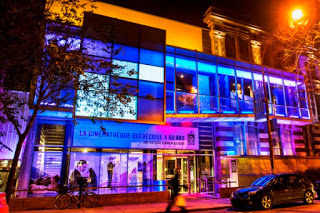
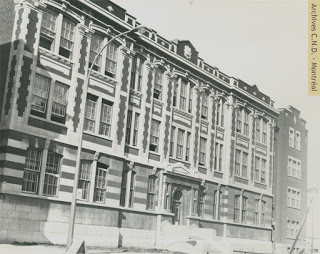
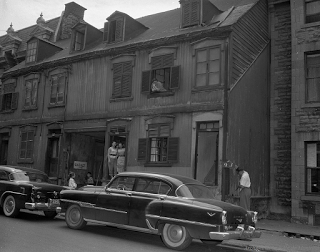
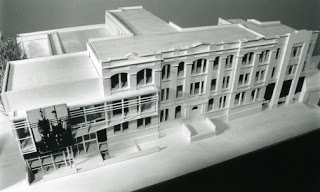
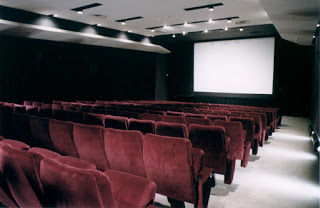
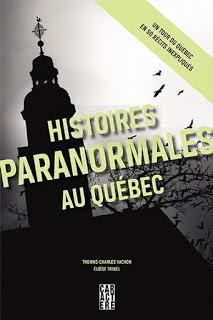
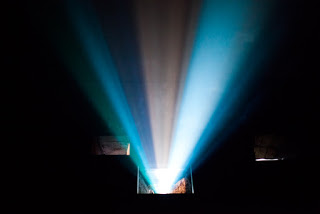
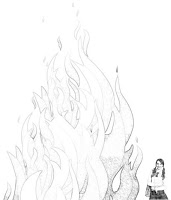

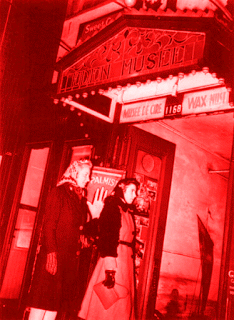
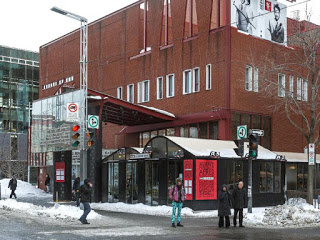



Comments (0)